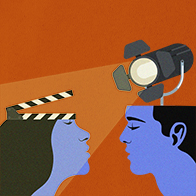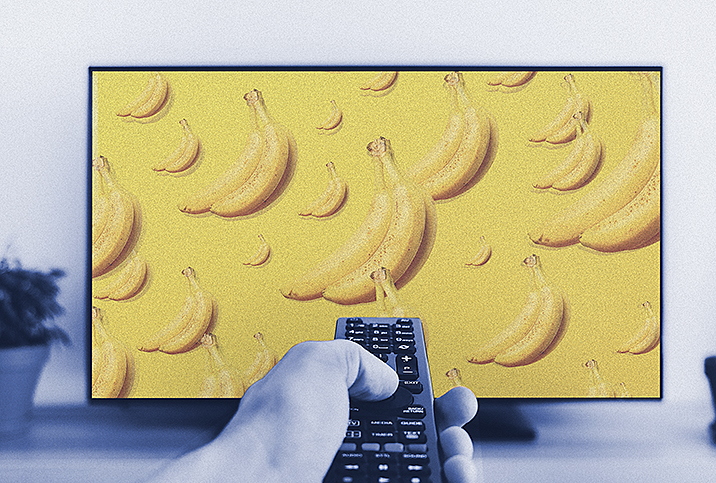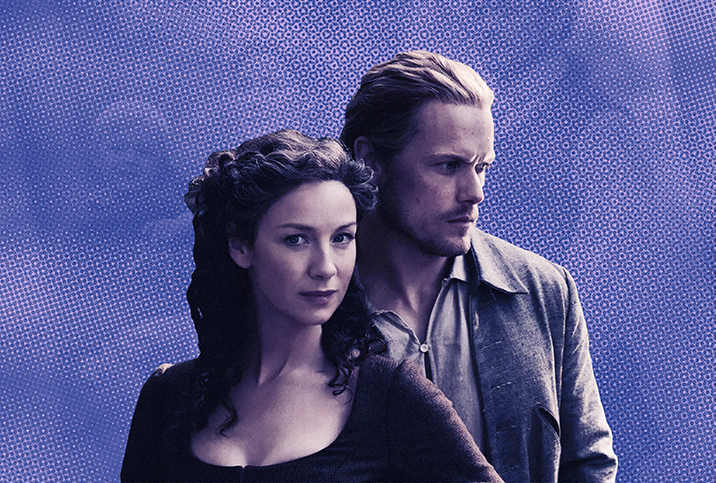It's Not Nudity, It's HBO: How The Cable Giant Changed Television

There was a time when the Home Box Office channel was just TV. Before the 1980s, HBO's programming primarily consisted of movies, sports, comedy and music specials. Original programming was not yet its bread and butter.
The premium television service spent the 1970s launching itself, first as a regional service in the Northeast region of the United States before eventually expanding to the national level and rising to prominence as the place where viewers could access movies and special programs without leaving the comfort of their home, hence, its name: Home Box Office.
However, things took a turn in the 1990s when HBO shifted its focus to original television programming. Then helmed by Chris Albretch, the premium cable network began to build a reputation for high-quality and irreverent original content. In 1996, a new slogan was coined— "It's Not TV. It's HBO"—signaling to anyone watching that the channel's content was unlike anything else.
Part of what set HBO apart was its representation of sex and nudity. The channel began featuring representations of nude bodies in 1990 with the show "Dream On." This comedy from future "Friends" creators Marta Kauffman and David Crane was the first American sitcom to use uncensored nudity and did so as a vehicle for comedy.
It's sexy, it's funny…it's a sexy comedy
The representation of nudity in "Dream On" was rather caricatural, according to Benjamin Campion, author of "HBO and Porn: Telling Stories Through Sex."
"It is a very patriarchal nudity, showing essentially young and alluring women who strip naked for the pleasure of these gentlemen and the hero, in particular, who is a womanizer with multiple conquests," Campion said. "It is a very feminine and very young representation of nudity, very framed and very straight."
To Campion, "Dream On" was clearly aimed at a male audience in its representations of the naked body, but it helped establish the foundations that would ultimately lead HBO to put forward shows such as "Sex and the City," which again used sex and nudity as a means for comedy.
The 1990s were a game changer for HBO. For instance, in 1997 came its first one-hour drama, "Oz," which focused on the lives of inmates in a maximum security prison. The show did not shy away from representing sex, nudity and violence in a much grittier manner than anything that had come before, even pushing the boundaries of what HBO was willing to put on the air.
'Sex and the City' depicted sex and nudity in a new way, as it was a series that made sex its subject but refrained from showing it explicitly.
A year later, "Sex and the City" made its grand debut and put sex at the center of its narrative.
"'Sex and the City' is a show that features a lot of sex but through comedy and uses it to de-dramatize all that," Campion explained. "It's a series about sex but doesn't linger on it when it comes to showing it. The scenes are quite fast, the sex is quite brief and it's always to produce a comedic effect."
"Sex and the City" depicted sex and nudity in a new way, as it was a series that made sex its subject but refrained from showing it explicitly. However, that's not to minimize the pioneering results of the show, because in many ways, "Sex and the City" paved the way for future representations of sex and nudity, especially with the female body.
In his book, Campion highlights that the show was indeed the first—and remains the only—to have featured a scene clearly illustrating female ejaculation. All in all, the male orgasm dominates on television when compared to representations of the female orgasm.
Sex as a narrative device on HBO
Starting in the late 1990s, HBO built its original programming catalog brick by brick, adding one new show to its lineup every year. While "The Sopranos" featured sex and nudity in less explicit and frequent ways than "Oz" or "Sex and the City," the cable network continued to give series creators the opportunity to fully dive into the subjects that interested them.
Another example is 2007's "Tell Me You Love Me," a short-lived drama series from Cynthia Mort following a marital therapist counseling patients facing intimate issues. Campion said that while the show didn't make a splash in the media and failed to amass a fervent audience, it's particularly interesting for the way it integrated sex into its narrative.
Where most shows feature sex scenes as fillers, using them as a way to dress the story, "Tell Me You Love Me" used sex scenes to contextualize its storylines, reversing common narrative tropes to put sex at its heart. In the show, it isn't through conversations or scenes of everyday lives that the characters reveal themselves, it's more about what's going on in their bedrooms.
"'Tell Me You Love Me' really incorporates nudity and sex into everyday life, and we can also say that of 'Girls' more recently," Campion added. "'Girls' [depicts] daily nudity because sometimes people at home walk around naked and the series simply shows it."
Nudity and normalizing the naked body
The representation of sex and nudity evolved on HBO from "Dream On" to "Sex and the City," and that same evolution continued from the Sarah Jessica Parker-led series to Lena Dunham's "Girls" in 2012.
"If we connect shows that explore similar topics, we can clearly see that each time it evolves, because morals also evolve and that HBO, like any channel, adapts to its time," Campion explained.
Where "Tell Me You Love Me" put the focus on everyday sex, "Girls" highlighted everyday nudity. In her series, Dunham never hesitated to show herself as she was, normalizing her body for audiences. It triggered conversations and pushed viewers to discuss the banality of nudity, and there was no shortage of opinions regarding how the show represented sex and naked bodies. The way it did so, however, was always anchored in Dunham's intent regarding her series.
For Campion, HBO doesn't have a checklist imposed on its creators to feature a certain amount of sex, nudity or other specificities. Instead, HBO aims to give them the space to tell the story they want to tell.
"There is everything and its opposite on HBO, with series at the antipodes where there is no nudity at all and sex is absent because that is not the point," Campion pointed out. "In fact, each series must have its own internal logic."
Even if HBO has a reputation and viewers come to accept a certain level of uncensored content—whether it's sex, nudity or violence—in the cable giant's original series, the truth is that it most often serves the story and isn't interested in shock value to attract viewers.
In a show like "The Deuce" (2017), which revolved around prostitution and the porn industry in 1970s and '80s New York City, nakedness and sex were essential to serving the story. However, in a show like "Divorce" (2016), which did not aim at exploring topics related to it, there is no sex or nudity at all.
"Each series is an author's vision," Campion explained. "So it depends on the context and it is necessary above all that people are in tune with the subject they want to develop, that the actors are comfortable in their role and that there's a connection that's created between the authors of the series and their actors so that everyone can go through with their approach and show what there is to show."
Revolutionary TV? HBO and male nudity
In many ways, the sex and nudity featured on HBO are not groundbreaking. In his research, Campion found that dramatic series expose sex and nudity a lot more than comedies do, and explicit sex scenes are also featured more in dramas than in comedies. In the representation of naked bodies, female nudity continues to overpower male nudity. Breasts, in particular, are the most exposed part of the female body, whereas penises remain largely hidden from the viewers' gaze (although that is changing in recent instances).
In "HBO and Porn," Campion observed that straight sex dominates representations on HBO to this day. When LGBTQIA+ relationships are featured in shows, explicit portrayals of what happens in the bedroom are rare. Additionally, there are few instances of sex scenes with people of color, save for a few exceptions, such as in Issa Rae's "Insecure."
Another point of pleasure rarely explored is female ejaculation, aside from occasional features on "Sex and the City."
Going full frontal—with precaution
If each series has its own norms of representation, the past 30 years have indicated that HBO can feature all or nothing.
In that vein, Campion explained that the TV series "Euphoria" was a meteorite that surprised everyone. When HBO ventured for the first time into the teen drama genre with this show in 2019, no one expected it to dive into teenage sex and nudity to the level that it did (Editor's note: Actors performing nude in the shows were all consenting adults.) Between locker rooms featuring full-frontal male nudity and grandmothers slashing penises, the way "Euphoria" tackled teen drama was unlike anything else on TV.
But while this particular show doesn't shy away from much, others are demonstrating a new approach to sex and nudity.
Post-2020, after the rise of the #MeToo movement, the addition of intimacy coordinators on sets and the complicated filming conditions imposed by the COVID-19 pandemic, several HBO series are increasing representations of sex and nudity but seem to be going about it differently.
"We are in a tense social and political context," Campion said. "I feel like HBO is a network that is being very careful and everything is very much scrutinized nowadays. We can see it with the 'Game of Thrones' spin-off ['House of the Dragon'], which even before airing raised questions about sex and nudity."
As HBO continues to go further and reveal more than traditional TV (and even some of its new streaming competition), its shows haven't always done so without raising concerns. Controversies surrounding the representation of sexual violence in "Game of Thrones" were plentiful, leading critics to keep a watchful eye on how its spinoff would represent similar subject matter.
"I think we're in a more cautious era where representations are being more careful, which is a good thing," Campion said. "HBO continues to give those who want to explore those topics the liberty to do so and to really dive into it. Other networks would probably want to do the same thing but they can't."
Even if streaming services are getting more explicit in their representations, the shows on HBO continue to be game changers, always moving the needle forward. Over the past 30 years, the way the premium cable network has featured sex and nudity has continuously evolved to reflect cultural changes, and it's set to continue doing so for years to come.
Editor's note: HBO did not respond to requests for comment.




















